First gamified perpetual futures decentralized exchange (DEX), Merkle Trade is unveiling its Token Generation Event (TGE) Sequence, which has a Liquidity Bootstrapping Auction (LBA) and Genesis Staking, a unique combination that is built on Aptos, the scalable, secure, and feature-rich Layer-1 blockchain. With the backing of well-known investors such as Hashed and Arrington Capital, Merkle Trade is expanding on the July 25th-started success of Genesis Staking by launching an LBA that runs from August 29 to September 5th.
For a prolonged period of time, the LBA will reward early users with unique USDC rewards. Merkle Trade sets itself apart from other perpetual DEXes by emphasizing easy and fun trading for all users, even occasional traders. With as little as $2 in collateral, traders may begin trading perpetual futures and take advantage of gas-free transactions and smooth order execution—also known as 1-click trading—that eliminates the need for continuous signatures. Because of its emphasis on user-friendly features, Merkle Trade has grown quickly, topping $12.9 billion in total trading volume, drawing in over 124,500 traders, and rising to the top of Aptos’ fee-generating protocols.
Building on this momentum, the project has introduced Genesis Staking and the Liquidity Bootstrapping Auction (LBA) as two new methods for users to interact with the platform via the introduction of a unique Token Generation Event (TGE) Sequence. These choices are made with both new and returning users in mind, offering a variety of methods for managing positions, securing MKL tokens, and reaping extra benefits.
PreMKL holders may keep their MKL tokens and get USDC rewards by using Genesis Staking. These rewards, which come from a share of the protocol’s earnings, provide recipients access to a unique reward pool that offers extra perks worth up to $200,000. With almost 3 million preMKL tokens staked for an average of more than 20 weeks—more than 22% of the circulating supply at the token launch—an outstanding milestone has been attained.
The Liquidity Bootstrapping Auction (LBA) provides a 7-day time for both new and current users to deposit USDC and/or preMKL. The first launch price of the MKL token will be determined by the ratio between the two assets. Participants get MKL-USDC LP tokens in return, which have two benefits: a portion of the whole MKL supply (1%), as well as trading fees produced by the pool.
It is advised that participants thoroughly consider the advantages of each choice in the TGE Sequence in relation to their financial objectives. Genesis Staking and the LBA are both intended to provide beneficial options, enabling individuals to choose the course that most closely matches their own goals. The team has released a $MKL TGE Cheatsheet with clear and simple instructions on how to navigate these choices to help with decision-making.
Users are advised to follow Merkle Trade’s official channels (X, Discord, dApp) for updates and additional information about how to take part in the LBA.








